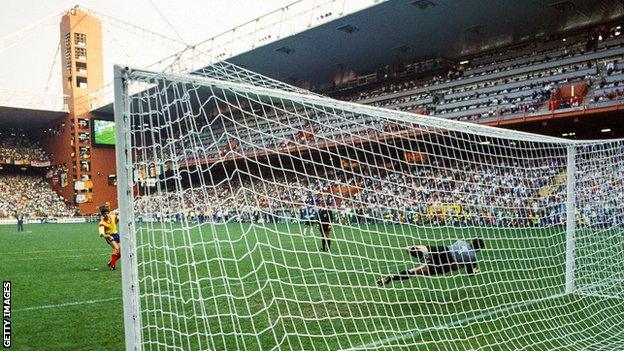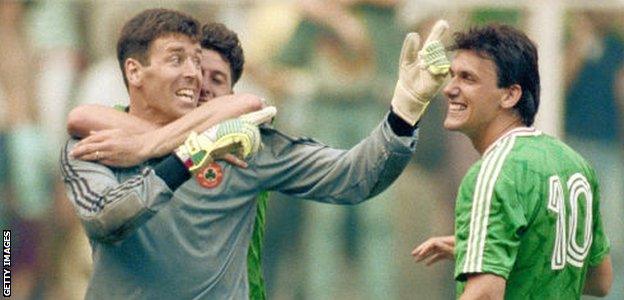Former Celtic & Ireland keeper Pat Bonner on the save that changed his life
- Published

Pat Bonner's penalty save from Romania's Daniel Timofte sent the Republic of Ireland into the quarter-finals at Italia 90
Pat Bonner's memory fails him when he tries to think back to the final months of Celtic's league season in 1990.
"It doesn't register," he says. "We finished fifth. Why would I want to remember that?"
The eight games without a win? "No, couldn't tell you a thing about it."
The 3-0 loss to Rangers at Ibrox (Celtic manager Billy McNeill went nuts in the aftermath); the 3-0 loss to a Gudmundur Torfason-inspired St Mirren in front of 18,841 at Celtic Park ("I thought I suffered the final humiliation last week against Rangers, but this team has proved me wrong," said a jaded McNeill); the 3-1 defeat to Aberdeen in Glasgow that followed it ("I'm just glad to see the league season over," remarked the manager).
It's all lost in time. "I couldn't tell you a single thing. What I know is that we lost some important players that season and we couldn't replace them," he says.
"I remember the cup final against Aberdeen. A bad ol' game. We lost 9-8 on penalties. I went the wrong way for eight of them. Couldn't read anything. That day kinda summed up our season. The way it all worked out was a bit pitiful."
For Bonner, there was an adventure to come and - finally - a penalty save that remains one of the most beloved moments in Ireland's football history.
It happened exactly 30 years ago, the goalkeeper springing to his right to push away Daniel Timofte's kick in the shoot-out against Romania in Genoa. The little hop and skip in the aftermath. The nation holding its breath as David O'Leary stepped forward to take the critical kick.
Big Dave - number of competitive football matches played: millions; number of penalties taken in competitive football matches: zero. O'Leary put it away with aplomb and Ireland made the quarter-finals of Italia '90, the first World Cup they ever qualified for. Three decades later and the scenes are still vivid, locked forever in glorious technicolour.
"I shouldn't say it, but knowing that the World Cup was coming up would have eased my pain about the way Celtic had played that season," Bonner says. "I was desperate to get away from that environment and back into something that was really positive.
"We'd had three draws (against England, Egypt and the Netherlands) and another draw after extra-time against Romania. Penalty shoot-out again. Here we go."
Bonner was buzzing. In the first three games he felt he hadn't contributed a whole lot to the cause, but the Romania match was different. He'd been busy and effective and was on a high because of it. Gheorghe Hagi had tested him but hadn't beaten him. The 120 minutes had ended 0-0.
"We were all in the centre circle and the referee - a Brazilian fella - was going around telling everybody to pull up their socks," he recalls. "I went over to Kevin Sheedy and I says, 'are you hitting a penalty?' He says, 'I'm hitting the first one and I'm hitting straight down the middle'. And that's what he did.
"Hagi took their first. I went the right way. It was weird. I almost knew where they were going to put them. I just had a sense. I went the right way every time, got a hand on Ioan Lupescu's one and was raging when it went in. It was 4-4 and Timofte was next."
Timofte was a 22-year-old attacking midfielder from Transylvania, a 96th-minute substitute on the day and now an icon of sorts from Donegal to Dingle.
"I watched him walking up and that walk must be the loneliest thing. Fifty yards and all the Irish fans facing him behind my goal. He stood at an acute angle to the ball, away to the left. He stood exactly where I wanted him to stand. I knew where he was putting it, I just knew.

Bonner is mobbed by team-mates Andy Townsend and Tony Cascarino after his save
"I jumped in the air when I saved it, then came round the front of the box and next thing I know Andy [Townsend] and Cas [Tony Cascarino] are on top of me. There's Dave's penalty to come, but the boys sprinted from the halfway line to congratulate me. 'What are you eejits doing? That's against the rules. This thing will have to be retaken. My big moment - gone!'
"Throughout the World Cup, Dave and Niall Quinn had this bet going. After every training session, Niall would take my gloves and go into goal and if you scored three penalties out of three he'd owe you a fiver. If you missed one, you'd owe him a fiver. Dave was up for it. It became a thing.
"They were doing this for six weeks. There were rollovers, doubles or quits, all sorts. I'm not sure anybody knew who owed what to who, but neither of them were giving up. I'm convinced that it was those penalties against Niall that gave Dave the confidence to go and hit that one in Genoa."
The boys knew that history was made that day. They also knew that back in Ireland everybody was going off their head with the euphoria of it all.
It was only when Bonner was asked to do a television interview a few days later that he realised how big this story had now become. He stepped into a room and there must have been 25 cameras in front of him from all different parts of the world. Ireland were playing the host nation and suddenly everybody wanted a piece of them.
The quarter-final was lost 1-0, but the legend of 1990 remains intact to this day. "Years later I did a thing with an Irish newspaper," Bonner recalls. "They'd gone to Romania to interview Timofte and they asked if I'd have a word with him on the phone. I knew he'd had a hard time when he went home.
"I asked him what was going through his mind as he was walking up to take the kick and he said that one of his team-mates told him that the goalie is slow on his right-hand side. He said he normally hit penalties down the middle, but he changed his mind. Can you imagine the regrets?
"He told me that he opened a pub and if anybody gave him stick for what happened in Genoa he'd throw them out. He called the pub The Penalty."
Bonner had a story of his own. Back home in Donegal, some of his clan were doing up an old boat at the time. They finished the job on the day of the match and later christened it Timofte.
"My daughter had been born in the April, so she was only about four weeks old when I left for Italy. I was desperate to see her," he says. "Thousands upon thousands of people turned up to see us arrive home, but all I wanted to do was get back to the family.
"Those memories will live on forever. It doesn't feel like 30 years, probably because it all comes up again quite often. We love to relive it. Irish people have emotionally attached themselves to that game and those penalties, they know where they were, they know who they were with and they know how they felt when the shoot-out was going on. They all have their own story."
And they'll never tire of telling it.